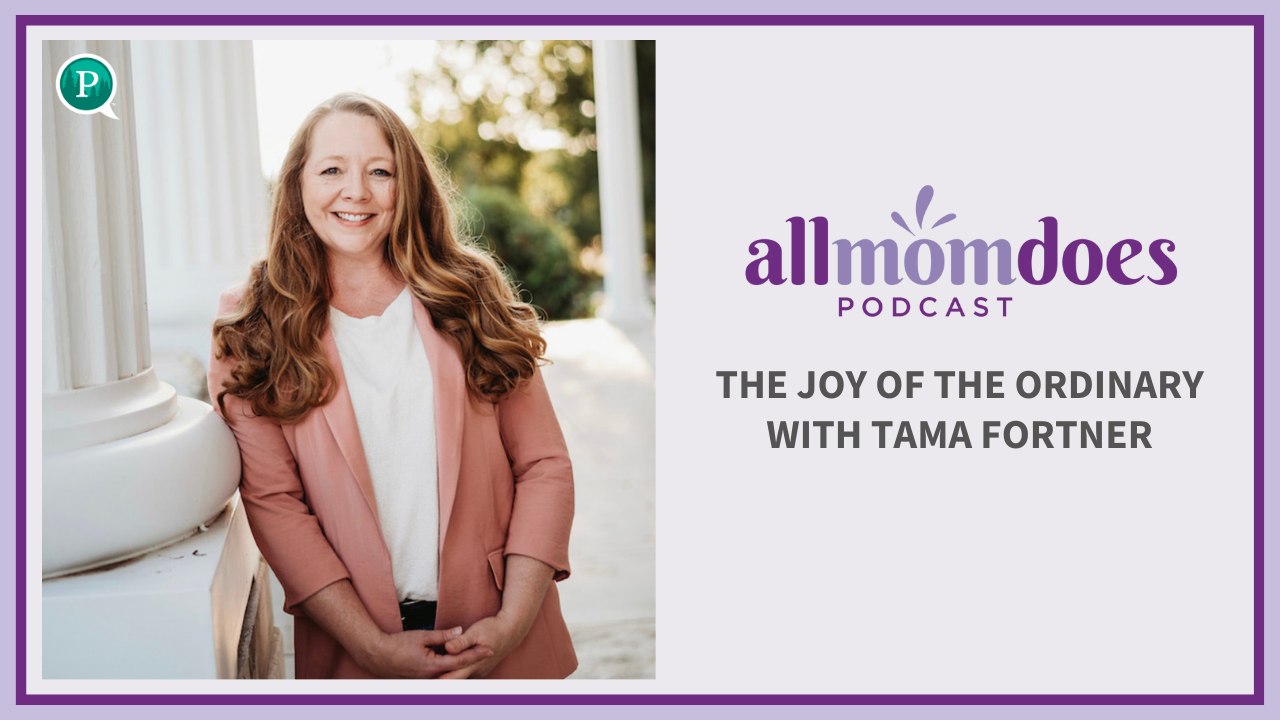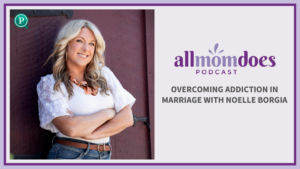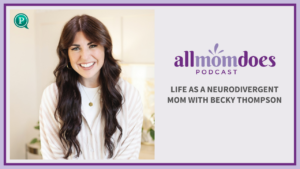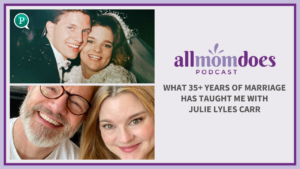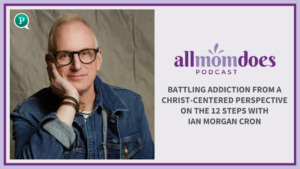Big dreams, big goal, big life, we spend a lot of time chasing after them. But what if there’s a different way to live, a way that can make even the most mundane Monday something magical? Tama Fortner joins AllMomDoes host Julie Lyles Carr for a timely conversation about the ordinary can be the extraordinary.
Show Notes:
Find Tama: Online | Instagram | Facebook | X
Find Julie: Online | Instagram | Facebook | X | Pinterest
Find AllMomDoes: Online | Instagram | Facebook | X
Transcription:
Tama Fortner:
And somewhere along the way, I started really soaking in the things that I was writing for kids. That faith really can be that simple, that it can be trusting God with the path. And maybe his path to you today is just simply getting through the day, and maybe it’s crushing it at work, and maybe it’s somewhere in between. But accepting that path as beautiful regardless I think is the key.
Julie Lyles Carr:
I’m Julie Lyles Carr, and you’re listening to the AllMomDoes Podcast, part of the Purposely Podcast Network. And we are here because we want you to see the beauty in your life. We hope to have answers and inspiration for things that you may be struggling with when it comes to your relationship, your career, your spiritual walk, your kids. That’s why we’re here and we are somehow in our seventh season.
It’s been really exciting thinking about guests, about people we can bring on to really speak life into your life. And so when this one came across my desk, I knew I wanted to have her on because there’s something that she teaches us to celebrate that we don’t often hear a lot about. Tama Fortner, thank you so much for coming on the podcast today. I really appreciate you being here.
Tama Fortner:
Thank you so much for having me. I am thrilled.
Julie Lyles Carr:
Tama, you’re in the Nashville area. Right now as we’re recording this, I’m in Austin, you’re in Tennessee, we both have been through a cold snap that for our listeners who are in say Colorado or Wyoming, they’re probably laughing at us. But for us, this kind of weather shuts things down. You have been in a virtual blizzard for the last couple of days. So tell me about what it’s looking like in Nashville right now.
Tama Fortner:
So we started out with about eight inches here on our side of town, and it’s slowly melting down to maybe five or so, but the temperatures I think are supposed to hit negative two tonight.
Julie Lyles Carr:
Ooh, that’s exciting.
Tama Fortner:
Yeah, we are unprepared for this to say the least. We’re just hunkering down at home with our hot tea and our blankets.
Julie Lyles Carr:
Yeah, good idea. Good idea. Actually, in 2021, Austin got socked in with snow and we ended up doing a whole little series on the AllMomDoes channels for viewers to see what it was like for a Texas family in Austin who is generally used to needing to survive 100 plus degree temperatures.
All these people hunkered down at my house, people from out of town who were in for a wedding who got stuck, how we were melting snow in the bathtub in order to be able to flush toilets. It was a whole thing, Tama. It was a whole thing. So I’m hoping that you guys dig out a lot faster than we did from that one.
Tama Fortner:
Oh, thankfully, we haven’t.
Julie Lyles Carr:
Yeah, exactly. You’re not getting that kind of an experience. I would not wish that on anyone. So we’ve established you’re in frosty Nashville. Tell me about your life, what’s going on in your world, what season of life you’re in, your loves, your hobbies, all the things.
Tama Fortner:
So yeah, so I am in a huge season of change and I think that comes at women at different phases in their life. And so I am transitioning from the stay-at-home mom phase to an empty nest. I have one daughter who is grown and married and living across town, and I have a son who has one more year of college. So he’s back and forth a little bit, but most of the time the nest is empty. I’m also transitioning from part-time writer to full-time writer, in that sandwich generation as I start to take on care of other folks. And yeah, it’s just a lot of change coming at me at once.
Julie Lyles Carr:
Right. Sandwich generation, such a great term. And I have to admit Tama, I was not prepared for how quickly that came into my life. I mean, I still had little kids. Now granted, I have a whole bunch of kids with two generations of these kids going on because from my oldest to my babies is 16 and a half years. But still, I had young children at home and all of a sudden found myself needing to make really life critical decisions for my parents, for my in-laws. I mean, it just came flying at me.
And there had been a period of time that I thought, well, when I get my kids raised to a certain point, then I’m going to have this moment where some things begin to clear a little more. And yet then I found that there were some new caregiving, caretaking activities that really took front stage in my life. Tell me about your experience right now as you’re entering that sandwich generation. What are some things that have surprised you about it?
Tama Fortner:
As you said, it surprised me how quickly it came. In my plans, and we can all laugh at that, my plans, I thought I would get my kids off to college and their own lives, and then I would have a chance to just explore who I am again. And instead, there were some caregiving to be done for a grandparent. My mom’s health started failing. Just all these issues hit at once. And then you still got, even though the kids are older, they still need mom. I think that surprised me how much they needed mom. I love it, but it’s a lot. There’s not that empty space that I thought I would have.
Julie Lyles Carr:
Right. I agree with that. I guess I had always thought about entering empty nest as, how am I going to fill my time? Tama, that has not been a problem in the least. And as you say, our kids still need us even when they get older. I think it’s one of the things that we don’t really talk about. There is a different ease. There is a lifting of some of that day-to-day maintenance type stuff. But there are also those late night phone calls with deep questions and sometimes some tears and frustration about relationships or jobs or the major in college.
And you find yourself still kind of on the night watch in ways that you might not have expected. And so when I think about my listener who’s coming to understand things about being a mom and what it means, and we a lot of times are talking to women who are just absolutely in the trenches with it, and I’m still there to a certain degree. But I think now about, well, what would I have told myself about this period of time, this sandwich experience, that could have prepared me a little more?
And first, like we both said, comes at you faster than you thought. I think the second thing I would say is, man, I wish I’d had slightly more awkward, uncomfortable, and more specific conversations with my parents and my in-laws about exactly what their wishes were going to be. Now, we were more prepared than most people, but I do think that that’s a conversation that we all need to be having sooner than later, that should be more specific, and something that I definitely want to make sure I’m doing for my kids because that was something I wasn’t quite prepared.
For you, what is something that you would tell your younger self? Like, “Hey, here’s a little snippet. Here’s a little tip. Be sure that you’re doing this as you hit this point, as you hit this season.”
Tama Fortner:
I would tell my younger self, and it’s really the same message I tell myself today, is just give yourself a little grace. This is hard. This is a lot. There are some things that can slide and there are some things that can’t. And make sure that you’re focusing on those things that can’t, the relationships with your family, with your extended family, and most of all, the relationship with God because, was it Nehemiah talks about, the joy of the Lord is your strength and that strength is what gets us through these trying situations.
Another thing more practical is my husband and I are actually keeping a list. When I get to this point in life, I will, I will not, and so that I can give that to my kids and maybe take some of that pressure off of them because there are so many unknowns that we just didn’t know the questions to ask.
Julie Lyles Carr:
Right, absolutely. I think that’s a lot of wisdom right there is that place that sometimes I look back and I’m like, I can’t believe I didn’t prepare for this or see this or know this. And then I think, wait a minute, I didn’t have a crystal ball. I didn’t know the questions to ask. I didn’t know that this was going to be something that was going to come up.
What I can do forward is share what I learned so that maybe if somebody’s heading into a situation that I didn’t feel prepared for, but now I can say, “Hey, think about this. Ask this question. Do that,” I think that’s a beautiful way we can pay it forward on some of these circumstances. Now, I’m going to take a bit of a pivot that’s a little bit funny because you and I share something in common that’s super weird. Get a little nervous. Get a little nervous. But I get a lot of questions about this.
I have a feeling you probably do too. You and I both have been prolific ghost writers. We’ve written for all kinds of people. We’ve written children’s books, stuff for teens, stuff for adults. We have done all of these things in the ghostwriting world, and it is one of the things probably, Tama, that in addition to raising eight kids, because people always want to know about that, it’s probably one of the questions I get the most about this path to ghostwritership, how this happened, how prevalent this is in publishing, and it’s one of these things that doesn’t get discussed a lot.
And so I’m just curious for you to tell the audience what your experience has been as a ghostwriter. And again, it is a really weird little sisterhood because there are just a handful of us out there. So what got you into that arena in addition to having your own books, just like me? We both have done all of this ghostwriting. So tell me about your experience and your way as you made your journey in this thing.
Tama Fortner:
So yeah, that started out in a total God thing. I was an in-house editor for Tommy Nelson, the children’s division of Thomas Nelson, and I needed to quit to have kids. And I had fixed a few books, fixed some of them, need a little oomph-ing up, while I was an in-house editor. And so when I left, I needed to replace that income because I was going on bedrest with my first daughter. And so I was hired to do a ghostwriting project actually with some of the Thomas Kinkade books and it’s so cool.
It just exactly replaced the salary I was going to be missing when I was on bedrest. So that was the first project. I went on to do a number of projects with Tommy Nelson. And I’m sure in your experience, editors move around all the time and they take our names with them, which is wonderful. I never had to advertise or put myself out there really. And so that ghostwriting was a great way to make contacts in the industry at all the different publishing houses.
And then I was able to use those to help me get an agent later, much later, and start working on some of my own books. But it was kind of a unique path. Today we’ll have to talk about how you got into ghostwriting. I don’t think I realized that.
Julie Lyles Carr:
Yeah, mine was similar in that it was just a God thing. Certainly not one of those things when you’re in fourth grade and you want to be the next Laura Ingalls Wilder that you think, “But boy, I hope I also write books in secret for a lot of people.” That’s not how those of us who love writing really think about it, but it was similar. My first book had come out in my name, and there was a project that came up that I was the kind of writer where I really was a writer’s writer and then got my first book deal.
Whereas today in publishing, for a lot of people, they’ve done a beautiful job gathering an audience, they have a great message, but they never claimed to be writers, but they definitely have a heartbeat and an important message. I was the other side of that. I really love the craft of writing. So I’d written my first book, turned that in. It went really well. And that publisher had a project come up and said, “Oh, well, I wonder if she would be interested in doing this,” because there was a fast turnaround, it needed to be a clean manuscript, all that kind of stuff.
And so that’s how I ended up. And similar, my name got bounced from house to house, and I had an agent already who was putting my work out there, but then she also began managing my ghostwriting inquiries and that was how I landed there. So very interesting. I think a lot about the fact that when people question it to some degree, I understand a lot of the questions around it, but I also think too, the apostle Paul had somebody who was helping him write some of his letters as he had challenges with his vision and with his health.
And I think a lot about that, this beautiful idea that we can have a compilation of people’s different skill sets, but a beautiful message that God’s given a particular individual that we get to help get across the line. So yeah, just something I know we get questions on and I know that listeners would be really fascinated to hear your course as well. So I think that’s really awesome. Now, in all of that, I’m so excited about a new book that you have that’s come out with your name on it, so not a ghostwriting project, and you really are helping us through the title.
It’s a devotional called Everyday Joys. One of the things that stood out to me when your publicist sent your information across my desk was your focus on the beautiful ordinary. And I have a deep, deep affection and devotion for Brother Lawrence’s work, Practicing the Presence of God, which is a monk from a gajillion years ago who really understood how to see God in these little tiny moments, in soap bubbles while he was washing dishes, all kinds of things. I actually just was exchanging some messages with Teresa Ann, who’s a guest we’ve had on.
I’ll ask Rebecca to put those episodes in the show notes when we’ve had Teresa Ann on. She’s just found this book and has fallen in love with it. Honestly, Tama, that’s what your work has reminded me of afresh is how to get excited about the ordinary. So give me your perspective on how we see the ordinary today and how it may trip us up and blind us to some of the beauties of things that are all around us.
Tama Fortner:
The roots of this book, and Brother Lawrence was definitely in there. I read him a few years ago, and it just gels around in our minds, right?
Julie Lyles Carr:
It does. Right.
Tama Fortner:
Yeah. But the roots of this were actually in a less than joyful time, and I prayed because I need to see your joy, Lord. That was the prayer I just threw up in desperation. It was that moment when everything in life was changing. We were in the middle of the pandemic. It was just chaos and all out of my control, which we love so much when things are all out of my control. But it started with that prayer when I was out on a walk one morning.
And in that instant, and this totally never happens that God answers a prayer instantly, but in that instant, he showed me his presence through the world he has created. And I think it’s, what is it, Romans 1:20, that his invisible attributes are visible in his creation. And so I saw the birds that he takes such care of. I heard the wind rustling through the trees as they clapped out their praise and the flowers that were just so splendidly clothed. And I realized in that moment that God really is with us every moment.
He promised that, but he really does keep that promise. And the trick, not trick, the skill I guess we need to develop is seeing him and letting our eyes be open to see his presence in our lives.
Julie Lyles Carr:
Right. I love that you have tapped back into this. And before we got on mic, I was telling you I see such a heartbeat, such a felt need today among women. I’m seeing a lot of things that talk about this simple life, ordinary moments, those kinds of things. And I love that we are getting back hopefully to seeing some of those things.
I worry at times, Tama, that our generation of women in trying to have it all and do it all and show all the things, I don’t think we in any way have meant to lead anybody astray, but I think that we began to set a bar that was so high that we forgot how to just enjoy simply where we are.
I think part of this has to do with personality too. I don’t know about you, but I am an oldest daughter, only girl, and I was taught to drive, drive, drive and to push and to go for all the things. And when you are very future casted, when you are always looking at, well, this is the next project, the next thing, when we get to hear when this happens, it makes it awfully hard to remain in the moment and appreciate what is immediate.
Did you find that you needed to adjust your filter, that you needed to adjust the way you were looking? Is your personality hinged a little different? What was that journey for you to begin to notice the ordinary and the joys and the ordinary in a fresh way?
Tama Fortner:
So I too am that oldest only girl.
Julie Lyles Carr:
What is it, girl? I was like, I know it. I know it.
Tama Fortner:
And there’s so much responsibility I think that’s put on us and maybe a lot that maybe we just grab for ourselves. But I once had a friend tell me that you can do anything, but you can’t do everything at the same time. And I think, as you said, we’ve put out that lie that maybe we can and that it’s only those big mountaintop moments, whether it’s in our faith or in our home life or in our career. It’s those things that we’ve always got to be striving for and it’s those things that matter.
But as my kids have grown up and as they come back to me and talk about the things that they remember and that were important to them, it was not those big moments. It was singing in the kitchen off-key. It was showing up at the ball games. They didn’t care if we had a home cooked meal necessarily. They just knew that mom was always there. And those ordinary moments are where life is really lived. And I think we need to honor and celebrate those because they do become extraordinary when we live them with God and with his purpose in mind.
Julie Lyles Carr:
Right. It’s interesting that you say that because I… It’s like we know this lesson, Tama. I can look back now that my mom and dad have gone on to be with the Lord. I look back and there were some really wonderful things that they wanted to provide for my brothers and I. There were some experiences we got to have that were amazing. And I do reflect on those. Those were great things. But what I really miss is the casserole on Tuesday night that my mom faithfully had on the table by a certain time, and I miss those kinds of moments the most when I look back on my own childhood.
With my kids, one of the great ways that I think that moms can really get this down in their heart, ask your kids what they have treasured. Most, even a five-year-old will have an answer for you about what has meant the most to them in the last couple of months. And oftentimes it’s going to be something that really surprises you. My oldest girls, one of the things they still talk about to this day is my husband would get down and play Barbies with them, and he did it wrong. It was always like adventure Barbie and cataclysmic Bruce Willis Die Hard movie Barbie plots.
But they still talk about how hilarious that was to them that he wasn’t playing Barbies right, but it was way more interesting and fascinating what he was doing. And now they recognize as adults how unique that was that he was willing to do that with them. With some of the other kids, it’s different things that pop up for them. One of the things that I think is so funny, I still don’t quite understand, my kids are weird, Tama, let’s just be honest, but we for a long time, because one of the kids started it, had an entire drawer in the refrigerator.
Here I am trying to keep groceries in for all these people and they designated a drawer as the mustard drawer, and it was filled with different kinds of mustard that kept showing up. They gave each other mustard for Christmas. I mean, it turned into this whole thing. A very ordinary condiment for ordinary days, for ordinary turkey sandwiches that turned into this really beautiful bonding kind of thing. How do we slow down enough to begin to even perceive the ordinary?
Because honestly, our brains are trying to capture… In many ways, we’re wired to capture the things that really stand out, that are big emergent things, particularly in a stressful world. How do we slow down enough to pay attention to that which we would even call ordinary today?
Tama Fortner:
I wish I had a checklist. I wish I could say, “Do A, B, and C and it’s all going to pop into place,” but it wasn’t that way for me. It was reading books. Brother Lawrence was a huge impact on my faith and my prayer life. Interestingly enough, my dog was a huge impact on stopping and slowing down because I had an agenda. I was going to get my walk done. It was going to take this long, and then I was going to get back, and then I had this dog who did not jive with my agenda. He’s like, “We’re not going that fast and we’re stopping here and here and here and here.”
And I knew I had a choice. I can get frustrated with those slowdowns, or I could just accept them and maybe find some enjoyment in them. And that trickled over into other areas of life because there’s just so much we cannot control. And taking time to appreciate the good, the presence of God in the daily moments of our life, recognizing him. It’s that prayer that Elijah prayed, Lord open our eyes to see, that really has made all the difference. It’s just giving ourselves permission to slow down and it’s a process. It’s not an instant thing.
Julie Lyles Carr:
Right. You know, Tama, I wonder too, and I feel like I have the right to say this because I was in vocational ministry for over a decade, I feel some responsibility that even in our messaging in our faith communities, we are not encouraging people to embrace the ordinary. We use lots of big terms. We talk about it as vision casting, where people have no vision, they perish. That’s scripture and I believe that, but I think the way we’ve transposed some of that has been you got to dream bigger.
You got to want more. You got to go further. We got to get bigger numbers for God. We’ve got to get the bigger project out there. We’ve got to build the big campus. We infuse so much of our church culture language, I don’t think we intend to do it this way because we’re looking at how God can do anything, but it’s almost like we’re seeding discontent.
So my question to you is, how do we begin to filter and understand messages that have to do with really God’s best for us in alignment with our human need to build the Tower of Babel, to build the bigger thing, to build and go and try to find for ourselves some way to make our name and our efforts last beyond the next generation and the next, when at the same time we’re often involved in faith communities or in secular work situations that are never about being content, that contentment is seen as some kind of stagnation.
How do we make sure that we’re not bringing those messages in and allowing it to create an environment internally and spiritually for us that is based on discontent?
Tama Fortner:
Going back to the ghostwriting, and this has maybe an odd tie in, and I don’t know what age groups you ghosted for, mine was primarily for children. And so I was taking those big concepts and I was simplifying them down to prayer. Prayer is simply talking to God. It’s having a conversation. Pray without ceasing is simply prayer without end. It’s popping in and saying hello to God every so often throughout your day. And I did that for years. We’re not going to talk about how many years.
And somewhere along the way, I started really soaking in the things that I was writing for kids. That faith really can be that simple, that it can be trusting God with the path. And maybe his path to you today is just simply getting through the day, and maybe it’s crushing it at work, and maybe it’s somewhere in between. But accepting that path as beautiful regardless I think is the key. And as a writer, and you’ve probably felt this, it can be hard because we are under such pressure now to say, “Look at me,” and that can make it a little bit tougher.
Julie Lyles Carr:
Right. I do think when we are settled in who we are in God and we lose some of the performance that we think we need to put out there, it does change our ability to find contentment in the ordinary and to celebrate that. But it can be a hard lesson for those of us who are wired a particular way, as we were saying, oldest daughters, things of that nature. Wherever someone falls within their personality style, sometimes that’s a tough thing to begin to inculcate into your own understanding of yourself.
I was so fortunate, I felt so blessed that one of my son-in-laws chose to propose to my daughter when I happened to be in town and got to see it. And one of the things that he did, he co-opted a line from a movie that they both love, but essentially got on one knee and asked her to build a little life with him, to pay taxes and to do laundry and to watch silly movies and to stay up too late.
I was going to be emotional anyway getting to see one of my kids get engaged, that was a big deal in general, but to stand there and bear witness to someone makes such a monumental ask, but to do it with such a beautiful embracing of what it takes to just run truly a daily life and to be happy in that was really profound, Tama. I thought, man, this is not the kind of thing that we typically do when we have these big moments asking someone to marry us, when we’re making wedding vows, when we’re promising our kids we want to give them a moon, that kind of a thing.
I think one of the reasons that we don’t is for some of us, I think we’re a little bit afraid that if we take our foot off the gas, we will collapse. We will not move anymore. We only know how to get moving forward out of a place of stress and adrenaline and all of the things. For you when you slow down and you begin to notice the ordinary and you start to run out of an overflow instead of out of the reserves, have you ever had moments that you were a little worried that you wouldn’t run as hard and as fast as maybe you thought you were “supposed to?”
How do we overcome that fear that if we actually do take a pause, take a breath, that we will continue to move forward in our lives? But we’re worried that if we don’t keep stressing ourselves out, we’re not going to get as much done.
Tama Fortner:
Oh, I read something the other day, and I wish I could remember the source, but it was basically, you’re not capable of messing up God’s plans. And he has a plan. It’s good. It’s perfect for us. And we’re going to veer off of it once in a while because that’s what we do, right? But he is always pursuing us to pull us back to that plan, to his purpose. And some days you’re going to crush it.
Some days I crush it with the going slow and the appreciating the ordinary, and some days I don’t. Some days I get caught up in the whirlwind and I just have to stop. Sometimes it’s even just in my mind as my hands and feet are still running and say, “Lord, show me the joy.” And he’s so faithful to do that.
Julie Lyles Carr:
Right. I feel like that’s a prevailing heartbeat in your writing in this devotional is show me the joy. Show me the joy. I love that heartbeat where we continue to go. Well, the book is just beautiful. Congratulations.
Tama Fortner:
Thank you.
Julie Lyles Carr:
It’s 40 devotionals. Because for my girls out there who are paper girls, I mean, I do love my digital stuff. I got my Notion. I got my Trello. I got all my stuff, but I do love beautiful paper. I love, you’re going to laugh, but you’re a book lover too, Tama, so it’s okay.
Tama Fortner:
Oh yes.
Julie Lyles Carr:
I love that the binding that’s on this allows it to lay open so that I can do that devotional piece. I just want you to know I noticed and I think it’s beautiful. And so tell the listener where they can find out more about you, about your work, and then also I’m assuming the book is available all the places. I’ll make sure Rebecca gets that in the show notes.
Tama Fortner:
Yes. So you can learn more about me at tamafortner.com. There’s links there to all my socials and everything. I’m under Tama Fortner Books everywhere. The book itself, Everyday Joys, is going to be available everywhere that you like to buy books, and I’m so excited to see it come out into the world.
Julie Lyles Carr:
Well, congratulations to you.
Tama Fortner:
Thank you.
Julie Lyles Carr:
And thank you for such a great reminder. Hey, mom, whether you are with those little ones and you are just trying to get to the next nap time, or you’ve launched kids and you’re not really sure what your next is, I just can’t thank Tama enough for such a timely reminder that even in all those places, it is the little tasks that build our days. It is the little moments that we get to have that actually make up for a really big life. So Tama, thank you for such a timely reminder.
Tama Fortner:
Thank you so much for having me.
Julie Lyles Carr:
Absolutely. All right, listener, you go check all that out. Rebecca will have it in the show notes, all the places where you can find all the things for Tama. And I want to challenge you, I want you to text into us to 89419, what is a little ordinary joy that God is showing you? You can text that to 89419. Rebecca gets those because we would love to show those and to share those in an upcoming episode and on our socials.
Be sure and check out AllMomDoes all the places, AllMomDoes.com. Phenomenal community that you’re going to find people who are also walking out their ordinary joys and they’ve got some great tips and tricks and encouragement and all the things. So be sure and check that out. I’m Julie Lyles Carr all the places. Mainly hang out at Instagram. Come see me over there, and I’ll see you next time on the AllMomDoes Podcast.
Follow this podcast:

